人教版2020--2021学年上学期高一英语期中测试卷及答案(含四套题)
2020-2021学年高一英语上学期期中考测试卷01(人教版新课标)(含答案)

2020-2021学年高一英语上学期期中考测试卷01(人教版新课标)第I卷(选择题)第一部分听力(共两节,满分30分)第一节(共5小题;每小题1.5分,满分7.5分)听下面5段对话。
每段对话后有一个小题,从题中所给的A、B、C 三个选项中选出最佳选项,并标在试卷的相应位置。
听完每段对话后,你都有10秒钟的时间来回答有关小题和阅读下一小题。
每段对话仅读一遍。
1.When will they ask Ken for dinner?A.Next Friday.B.This Thursday.C.This Friday.【答案】C【解析】【原文】W: Is Ken coming back soon? I miss him very much.M: He was supposed to arrive next Friday, but he’s coming this Thursday.W: Let’s have him over for dinner on the following night after his arrival.2.How much did the woman pay?A.100dollars.B.80dollars.C.50dollars.【答案】B【解析】【原文】M: How much did you pay for your new dress?W: They wanted 100 dollars, but can you believe it? I got it with a 20% discount!M: Oh, not bad. But I found it sold online only for half that price.3.Where does the conversation probably take place?A.In a supermarket.B.In a hospital.C.In a restaurant.【答案】C【解析】【原文】W: I hope you don’t get sick.M: Oh, I feel fine. I wish I had room for more icecream.W: Even if icecream won’t make you sick, the price of it will.4.What does the man want the woman to do?A.Attend the party.B.Invite more people.C.Prepare the food.【答案】A【解析】【原文】M: Our club is going to give a party this Saturday night. Can you make it?W: Sure. Is it okay if I bring several friends along?M: No problem. There will be plenty of snacks and drinks. We’ll have fun.5.What are the couple talking about?A.Drinking tea.B.Buying a gift C.Having a habit.【答案】B【解析】【原文】M: What do you think I ought to get for your father?W: Why don’t you get him a box of oolong tea?M: Good idea. He can’t go a day without tea.第二节(共15小题;每小题1.5分,满分22.5分)听下面5段对话或独白。
人教版2020--2021学年上学期高一英语期中测试卷及答案(含五套题)
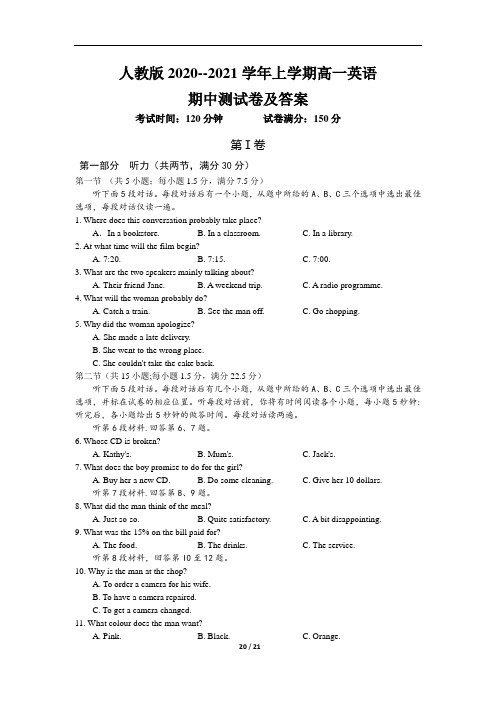
人教版2020--2021学年上学期高一英语期中测试卷及答案考试时间:120分钟试卷满分:150分第Ⅰ卷第一部分听力(共两节,满分30分)第一节(共5小题;每小题1.5分,满分7.5分)听下面5段对话。
每段对话后有一个小题,从题中所给的A、B、C三个选项中选出最佳选项,每段对话仅读一遍。
1. Where does this conversation probably take place?A.In a bookstore. B. In a classroom. C. In a library.2. At what time will the film begin?A. 7:20.B. 7:15.C. 7:00.3. What are the two speakers mainly talking about?A. Their friend Jane.B. A weekend trip.C. A radio programme.4. What will the woman probably do?A. Catch a train.B. See the man off.C. Go shopping.5. Why did the woman apologize?A. She made a late delivery.B. She went to the wrong place.C. She couldn't take the cake back.第二节(共15小题;每小题1.5分,满分22.5分)听下面5段对话。
每段对话后有几个小题,从题中所给的A、B、C三个选项中选出最佳选项,并标在试卷的相应位置。
听每段对话前,你将有时间阅读各个小题,每小题5秒钟:听完后,各小题给出5秒钟的做答时间。
每段对话读两遍。
听第6段材料.回答第6、7题。
6. Whose CD is broken?A. Kathy's.B. Mum's.C. Jack's.7. What does the boy promise to do for the girl?A. Buy her a new CD.B. Do some cleaning.C. Give her 10 dollars.听第7段材料.回答第8、9题。
人教版2020--2021学年上学期高一英语期中测试卷及答案(含两套题)
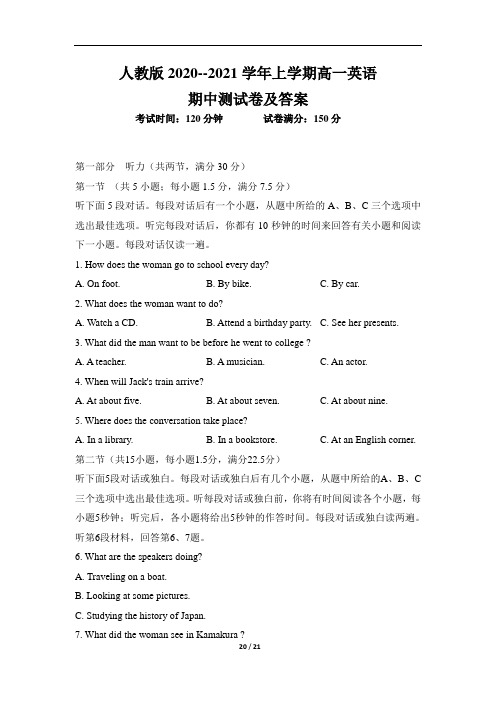
人教版2020--2021学年上学期高一英语期中测试卷及答案考试时间:120分钟试卷满分:150分第一部分听力(共两节,满分30分)第一节(共5小题;每小题1.5分,满分7.5分)听下面5段对话。
每段对话后有一个小题,从题中所给的A、B、C三个选项中选出最佳选项。
听完每段对话后,你都有10秒钟的时间来回答有关小题和阅读下一小题。
每段对话仅读一遍。
1. How does the woman go to school every day?A. On foot.B. By bike.C. By car.2. What does the woman want to do?A. Watch a CD.B. Attend a birthday party.C. See her presents.3. What did the man want to be before he went to college ?A. A teacher.B. A musician.C. An actor.4. When will Jack's train arrive?A. At about five.B. At about seven.C. At about nine.5. Where does the conversation take place?A. In a library.B. In a bookstore.C. At an English corner. 第二节(共15小题,每小题1.5分,满分22.5分)听下面5段对话或独白。
每段对话或独白后有几个小题,从题中所给的A、B、C 三个选项中选出最佳选项。
听每段对话或独白前,你将有时间阅读各个小题,每小题5秒钟;听完后,各小题将给出5秒钟的作答时间。
每段对话或独白读两遍。
听第6段材料,回答第6、7题。
6. What are the speakers doing?A. Traveling on a boat.B. Looking at some pictures.C. Studying the history of Japan.7. What did the woman see in Kamakura ?A. The Giant Buddha.B. Some temples.C. The highest building. 听第7段材料,回答第8、9题。
人教版2020--2021学年上学期高一英语期中测试卷及答案(含五套题)

人教版2020--2021学年上学期高一英语期中测试卷及答案考试时间:120分钟试卷满分:150分第一部分听力(共两节,满分30分)第一节(共5小题;每小题1.5分,满分7.5分)听下面5段对话。
每段对话后有一个小题,从题中所给的A、B、C三个选项中选出最佳选项。
听完每段对话后,你都有10秒钟的时间来回答有关小题和阅读下一小题。
每段对话仅读一遍。
1. How does the woman go to school every day?A. On foot.B. By bike.C. By car.2. What does the woman want to do?A. Watch a CD.B. Attend a birthday party.C. See her presents.3. What did the man want to be before he went to college ?A. A teacher.B. A musician.C. An actor.4. When will Jack's train arrive?A. At about five.B. At about seven.C. At about nine.5. Where does the conversation take place?A. In a library.B. In a bookstore.C. At an English corner. 第二节(共15小题,每小题1.5分,满分22.5分)听下面5段对话或独白。
每段对话或独白后有几个小题,从题中所给的A、B、C 三个选项中选出最佳选项。
听每段对话或独白前,你将有时间阅读各个小题,每小题5秒钟;听完后,各小题将给出5秒钟的作答时间。
每段对话或独白读两遍。
听第6段材料,回答第6、7题。
6. What are the speakers doing?A. Traveling on a boat.B. Looking at some pictures.C. Studying the history of Japan.7. What did the woman see in Kamakura ?A. The Giant Buddha.B. Some temples.C. The highest building. 听第7段材料,回答第8、9题。
人教版2020--2021学年上学期高一英语期中测试卷及答案(含两套题)

人教版2020--2021学年上学期高一英语期中测试卷及答案考试时间:120分钟试卷满分:150分第一卷(共85分)第一部分听力(共20小题,每题1分,满分20分)第一节听下面5段对话。
每段对话后有一个小题,从题中所给的A、B、C三个选项中选出最佳选项。
听完每段对话后,你都有10秒钟的时间来回答有关小题和阅读下一小题。
每段对话仅读一遍。
1. What color book does the man want?A. The red one.B. The blue one.C. The black one.2. What did the woman do on her vacation?A. She went for a bike ride.B. She relaxed on the beach.C. She cooked a fancy dinner.3. When does the man have breakfast on weekends?A. At about 9:00.B. At about 10:00.C. At about 11:00.4. What will Lisa do after school?A. Go home directly.B. Come to Tim’s house.C. Stay late to do homework.5. What does the woman say about her house?A. It’s next to a bar.B. It’s in the city center.C. It’s not comfortable inside.第二节听下面5段对话或独白。
每段对话或独白后有几个小题,从题中所给的A、B、C三个选项中选出最佳选项。
听每段对话或独白前,你将有时间阅读各个小题,每小题5秒钟;听完后,各小题将给出5秒钟的作答时间。
每段对话或独白读两遍。
2020-2021学年度高一上学期期中考试英语试卷及答案(含三套题)
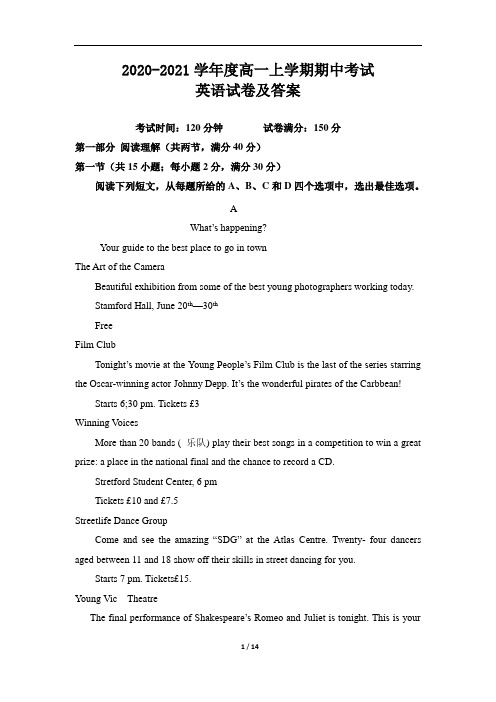
2020-2021学年度高一上学期期中考试英语试卷及答案考试时间:120分钟试卷满分:150分第一部分阅读理解(共两节,满分40分)第一节(共15小题;每小题2分,满分30分)阅读下列短文,从每题所给的A、B、C和D四个选项中,选出最佳选项。
AWhat’s happening?Your guide to the best place to go in townThe Art of the CameraBeautiful exhibition from some of the best young photographers working today.Stamford Hall, June 20th—30thFreeFilm ClubTonight’s movie at the Young People’s Film Club is the last of the series starring the Oscar-winning actor Johnny Depp. It’s the wonderful pirates of the Carbbean!Starts 6;30 pm. Tickets £3Winning V oicesMore than 20 bands ( 乐队) play their best songs in a competition to win a great prize: a place in the national final and the chance to record a CD.Stretford Student Center, 6 pmTickets £10 and £7.5Streetlife Dance GroupCome and see the amazing “SDG” at the Atlas Centre. Twenty- four dancers aged between 11 and 18 show off their skills in street dancing for you.Starts 7 pm. Tickets£15.Young Vic TheatreThe final per formance of Shakespeare’s Romeo and Juliet is tonight. This is yourlast chance to see this wonderful play. Don’t miss it.Starts 8 pm. Tickets £9, £7 and £5.5021. What can we learn about the Art of the Camera?A. It lasts half a monthB. It shows some old photosC. It is open to the public for freeD.It is held by 24 young artists22. Where can you watch street dancing ?A. At the Atlas CentreB.In Stamford HallC. At Young Vic TheatreD. At Stretford Student Centre23. If John only has £4, what could he do?A. See Romeo and JulietB.Watch Winning V oicesC.Watch Streetlife Dance GroupD. See Pirates of the CaribbeanBA long time ago, there was a farmer who had ten donkeys(驴). One evening, after a long day of hard work, the farmer returned home with the donkeys and began to tie them to the stakes(桩). When he finished nine donkeys, he found that the tenth rope was gone.What now? He could not let the last donkey run around all night. It would surely run away. Suddenly, he saw that, under a tree, there was a monk(和尚). The farmer ran to the monk and asked for voice. The monk said, “The only thing you have to do to the tenth donkey is make the movements(动作) you would have made with a rope in your hands. Pretend (假装) to tie the donkey. That’s all.”The farmer returned to the tenth donkey, pretended to fasten(拴紧) a rope around its neck and then to tie the rope to a stake. He then entered his little house, half trusting the monk’s advice, half worried that his donk ey would run away in the middle of the night.When he went outside very early the next morning, all the donkeys were still standing nicely next to their stakes, even the tenth one. The farmer untied the donkeys and wanted to take them to the field. But to his surprise, donkey number ten refused to move an inch. The farmer pulled and shouted but the animal just didn’t move.Suddenly, the farmer thought of what he had done to the donkey the night before. With a great “ah ha”, he returned to donkey number ten,and just after a simple movement the donkey happily walked with him to the field.24. What was the farmer’s problem when he tied the donkey?A. He needed one more rope.B. The tenth stake was gone.C. The tenth donkey ran away.D. He had left a rope in the field.25. Following the monk’s advice, what did the farmer do?A. He pretended to tie the tenth donkey.B.He went to sleep straight.C. He watched the tenth donkey all night.D. He tied the tenth donkey to the ninth stake.26. What did the farmer find in the next morning?A. All the donkeys were gone.B. The tenth donkey didn’t run away.C. Donkey number ten was running around.D. The donkeys went to the field by themselves.27. What does the underlined part“ a simple movement”refer to?A. Taking away the tenth stake.B. Pretending to untie the donkey.C. Pretending to cut the tenth rope.D. Trying the tenth donkey with a real rope.CFirst Lady Michelle Obama is a big fan of volunteering. V olunteering means working for free to help someone else. Mrs. Obama says volunteering is very important. “It should be part of everyone’s life, ” she says.Many teens agree. They say that helping others feels great and makes a difference. These days, more teens volunteer than work for pay. Teens clean up parks, walk dogs at animal shelters , visit the elderly and more.Some cities ---- including Seatle, Chicago, and Washingtong,D.C. ----require high school students to volunteer. Students must volunteer in order to graduate. Thestudent volunteers learn new skills and help their communities .Many parents are in favor of the idea ---- they say volunteering helps teens build job skills. But most teens don’t want to be forced to volunteer. They say they are busy. And they say voluntee ring is only fun if it’s a choice.Read both sides of the debate and decide.YESV olunteering can help teens get into college or get a job.Many cities and towns need help. V olunteers can help keep important programs going.Not all teens will volunteer if it isn’t required. Schools should repuire students to do all they can to get ready for adult life.NOMost teens are already very busy with classes, homework, jobs and sports. Forcing them to do more isn’t fair.It should be up to each person. Helping out doesn’t feel as good if you have to do it.Finding a volunteer job isn’t always easy. Students shouldn’t be kept from graduating because of something they can’t control.28. The writer mentions Michelle Obama in order to ,A. explain what volunteering isB. show she enjoys volunteeringC. tell what she does for the US D . introduce the topic of the text29. According to the text, in Chicago, .A. more people would rather work for payB. finding a volunteer job is quite easyC. volunteering is a must for high school studentsD. college students have to volunteer before graduation30. The underlined part “are in favor of “in the text means” .A. dropB. developC. likeD.catch31. Which question does the text mainly discuss?A. Is volunteering good for students?B.Which volunteer jobs shouldstudents do?C. What is the best time to volunteer?D. Should students be required to volunteer?DCoffee is an important part of Italian culture and since arriving here over six months ago, I have drunk a lot of it!Of course, coffee is also very popular in the UK but coffee culture in Italy is completely different. In Italy, when you order a coffee in a cafe or bar(酒吧), you are served with a tiny, bitter espresso. This is “normal (正常的) coffee” for Italians and they are not so interested in the huge coffees that we drink in the UK. If you want more than one sip(小口) of coffee in Italy, lungo is a good choice. In addition, while takeaway coffee is quite popular among Brits, it is not very common at all in Italy. Generally, Italians prefer to drink their tiny coffees while standing at the bar and, for many, this short break is an important part of their day.Usually, breakfast in a bar in Italy -includes a coffee and a pastry (酥皮糕点). Cappuccinos are very popular at breakfast time and, for me, a creamy cappuccino and a pastry with chocolate is the perfect way to start the day.Finally, I have found that coffee in Italy, such as espresso or macchiato (an espresso with a drop of milk), is so much cheaper than coffee in the UK. They are small, of course, but this means that in Italy it is possible to go out for coffee every day without breaking the bank.32.How is Paragraph 2 mainly developed?A.By time.B. By space.C. By comparisonD.By example.33.Which coffee will you get in Italy if you order one without special instructions?A. Espresso.B. Lungo.C. Cappuccino.D. Macchiato.34.What can we learn about the coffee culture in Italy?A.Takeaway coffee is very popular among Italians.B.Italians are very often seen drinking huge coffees.C.Few Italians take short breaks from work for coffee.D.Coffees are often served along with pastries during breakfasts.35.What does the author think of Italian coffee?A.She loves its bitter taste.B.It is too expensive for her.C.The cup it is served in is too small.D.It is a good choice for breakfast.第二节(共5小题;每小题2分,满分10分)根据短文内容,从短文后的选项中选出能填入空白处的最佳选项。
人教版2020--2021学年上学期高一英语期中测试卷及答案
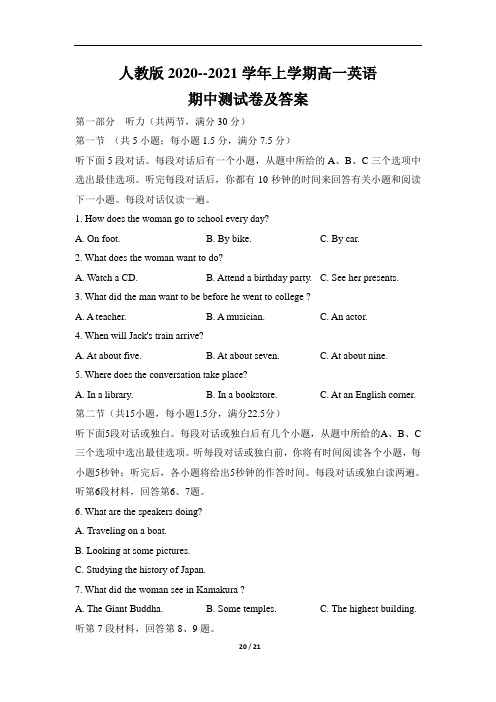
人教版2020--2021学年上学期高一英语期中测试卷及答案第一部分听力(共两节,满分30分)第一节(共5小题;每小题1.5分,满分7.5分)听下面5段对话。
每段对话后有一个小题,从题中所给的A、B、C三个选项中选出最佳选项。
听完每段对话后,你都有10秒钟的时间来回答有关小题和阅读下一小题。
每段对话仅读一遍。
1. How does the woman go to school every day?A. On foot.B. By bike.C. By car.2. What does the woman want to do?A. Watch a CD.B. Attend a birthday party.C. See her presents.3. What did the man want to be before he went to college ?A. A teacher.B. A musician.C. An actor.4. When will Jack's train arrive?A. At about five.B. At about seven.C. At about nine.5. Where does the conversation take place?A. In a library.B. In a bookstore.C. At an English corner. 第二节(共15小题,每小题1.5分,满分22.5分)听下面5段对话或独白。
每段对话或独白后有几个小题,从题中所给的A、B、C 三个选项中选出最佳选项。
听每段对话或独白前,你将有时间阅读各个小题,每小题5秒钟;听完后,各小题将给出5秒钟的作答时间。
每段对话或独白读两遍。
听第6段材料,回答第6、7题。
6. What are the speakers doing?A. Traveling on a boat.B. Looking at some pictures.C. Studying the history of Japan.7. What did the woman see in Kamakura ?A. The Giant Buddha.B. Some temples.C. The highest building. 听第7段材料,回答第8、9题。
人教版2020--2021学年上学期高一英语期中测试卷及答案(含七套题)
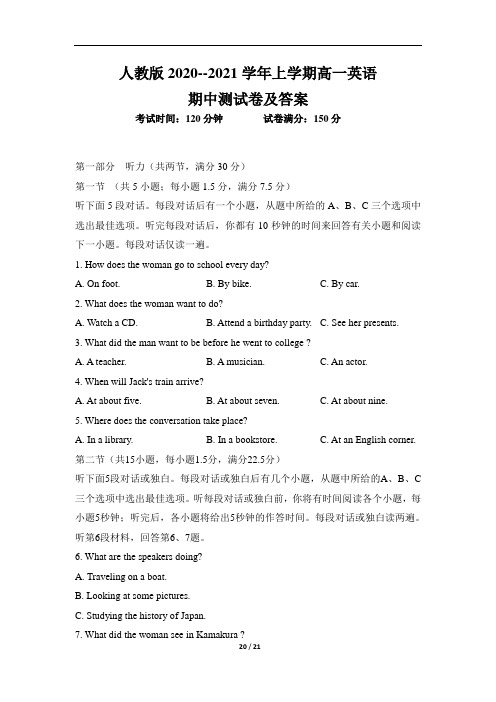
人教版2020--2021学年上学期高一英语期中测试卷及答案考试时间:120分钟试卷满分:150分第一部分听力(共两节,满分30分)第一节(共5小题;每小题1.5分,满分7.5分)听下面5段对话。
每段对话后有一个小题,从题中所给的A、B、C三个选项中选出最佳选项。
听完每段对话后,你都有10秒钟的时间来回答有关小题和阅读下一小题。
每段对话仅读一遍。
1. How does the woman go to school every day?A. On foot.B. By bike.C. By car.2. What does the woman want to do?A. Watch a CD.B. Attend a birthday party.C. See her presents.3. What did the man want to be before he went to college ?A. A teacher.B. A musician.C. An actor.4. When will Jack's train arrive?A. At about five.B. At about seven.C. At about nine.5. Where does the conversation take place?A. In a library.B. In a bookstore.C. At an English corner. 第二节(共15小题,每小题1.5分,满分22.5分)听下面5段对话或独白。
每段对话或独白后有几个小题,从题中所给的A、B、C 三个选项中选出最佳选项。
听每段对话或独白前,你将有时间阅读各个小题,每小题5秒钟;听完后,各小题将给出5秒钟的作答时间。
每段对话或独白读两遍。
听第6段材料,回答第6、7题。
6. What are the speakers doing?A. Traveling on a boat.B. Looking at some pictures.C. Studying the history of Japan.7. What did the woman see in Kamakura ?A. The Giant Buddha.B. Some temples.C. The highest building. 听第7段材料,回答第8、9题。
人教版2020--2021学年上学期高一英语期中测试卷及答案(含两套题)

人教版2020--2021学年上学期高一英语期中测试卷及答案考试时间:120分钟试卷满分:150分第一部分听力(共两节,满分30分)第一节(共5小题;每小题1.5分,满分7.5分)听下面5段对话。
每段对话后有一个小题,从题中所给的A、B、C三个选项中选出最佳选项。
听完每段对话后,你都有10秒钟的时间来回答有关小题和阅读下一小题。
每段对话仅读一遍。
1. How does the woman go to school every day?A. On foot.B. By bike.C. By car.2. What does the woman want to do?A. Watch a CD.B. Attend a birthday party.C. See her presents.3. What did the man want to be before he went to college ?A. A teacher.B. A musician.C. An actor.4. When will Jack's train arrive?A. At about five.B. At about seven.C. At about nine.5. Where does the conversation take place?A. In a library.B. In a bookstore.C. At an English corner. 第二节(共15小题,每小题1.5分,满分22.5分)听下面5段对话或独白。
每段对话或独白后有几个小题,从题中所给的A、B、C 三个选项中选出最佳选项。
听每段对话或独白前,你将有时间阅读各个小题,每小题5秒钟;听完后,各小题将给出5秒钟的作答时间。
每段对话或独白读两遍。
听第6段材料,回答第6、7题。
6. What are the speakers doing?A. Traveling on a boat.B. Looking at some pictures.C. Studying the history of Japan.7. What did the woman see in Kamakura ?A. The Giant Buddha.B. Some temples.C. The highest building. 听第7段材料,回答第8、9题。
人教版2020--2021学年上学期高一英语期中测试卷及答案(含两套题)
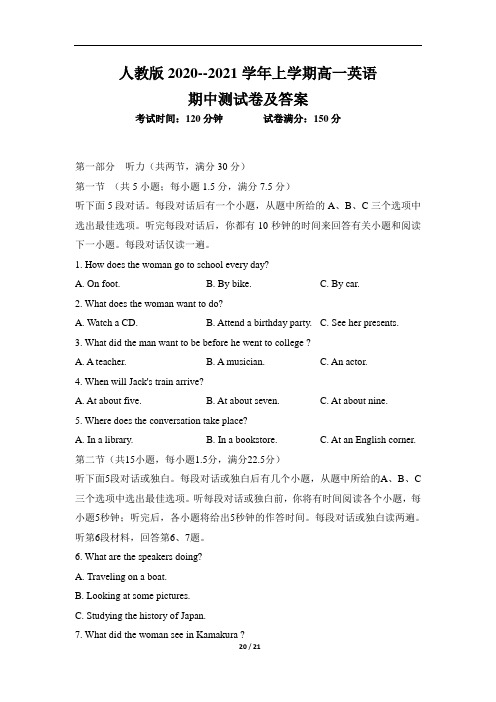
人教版2020--2021学年上学期高一英语期中测试卷及答案考试时间:120分钟试卷满分:150分第一部分听力(共两节,满分30分)第一节(共5小题;每小题1.5分,满分7.5分)听下面5段对话。
每段对话后有一个小题,从题中所给的A、B、C三个选项中选出最佳选项。
听完每段对话后,你都有10秒钟的时间来回答有关小题和阅读下一小题。
每段对话仅读一遍。
1. How does the woman go to school every day?A. On foot.B. By bike.C. By car.2. What does the woman want to do?A. Watch a CD.B. Attend a birthday party.C. See her presents.3. What did the man want to be before he went to college ?A. A teacher.B. A musician.C. An actor.4. When will Jack's train arrive?A. At about five.B. At about seven.C. At about nine.5. Where does the conversation take place?A. In a library.B. In a bookstore.C. At an English corner. 第二节(共15小题,每小题1.5分,满分22.5分)听下面5段对话或独白。
每段对话或独白后有几个小题,从题中所给的A、B、C 三个选项中选出最佳选项。
听每段对话或独白前,你将有时间阅读各个小题,每小题5秒钟;听完后,各小题将给出5秒钟的作答时间。
每段对话或独白读两遍。
听第6段材料,回答第6、7题。
6. What are the speakers doing?A. Traveling on a boat.B. Looking at some pictures.C. Studying the history of Japan.7. What did the woman see in Kamakura ?A. The Giant Buddha.B. Some temples.C. The highest building. 听第7段材料,回答第8、9题。
2020-2021学年度高一上学期期中考试英语试卷及答案(含三套题)
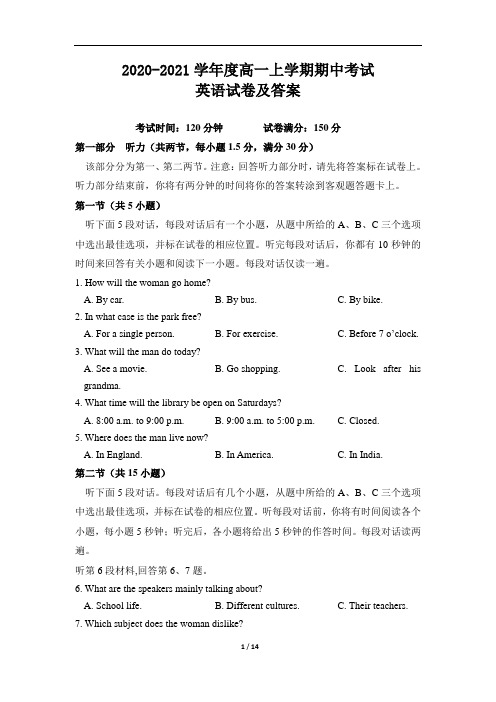
2020-2021学年度高一上学期期中考试英语试卷及答案考试时间:120分钟试卷满分:150分第一部分听力(共两节,每小题1.5分,满分30分)该部分分为第一、第二两节。
注意:回答听力部分时,请先将答案标在试卷上。
听力部分结束前,你将有两分钟的时间将你的答案转涂到客观题答题卡上。
第一节(共5小题)听下面5段对话,每段对话后有一个小题,从题中所给的A、B、C三个选项中选出最佳选项,并标在试卷的相应位置。
听完每段对话后,你都有10秒钟的时间来回答有关小题和阅读下一小题。
每段对话仅读一遍。
1. How will the woman go home?A. By car.B. By bus.C. By bike.2. In what case is the park free?A. For a single person.B. For exercise.C. Before 7 o’clock.3. What will the man do today?A. See a movie.B. Go shopping.C. Look after his grandma.4. What time will the library be open on Saturdays?A. 8:00 a.m. to 9:00 p.m.B. 9:00 a.m. to 5:00 p.m.C. Closed.5. Where does the man live now?A. In England.B. In America.C. In India.第二节(共15小题)听下面5段对话。
每段对话后有几个小题,从题中所给的A、B、C三个选项中选出最佳选项,并标在试卷的相应位置。
听每段对话前,你将有时间阅读各个小题,每小题5秒钟;听完后,各小题将给出5秒钟的作答时间。
每段对话读两遍。
听第6段材料,回答第6、7题。
6. What are the speakers mainly talking about?A. School life.B. Different cultures.C. Their teachers.7. Which subject does the woman dislike?A. History.B. English.C. Math.听第7段材料,回答第8、9题。
人教版2020--2021学年上学期高一英语期中测试卷及答案(含两套题)
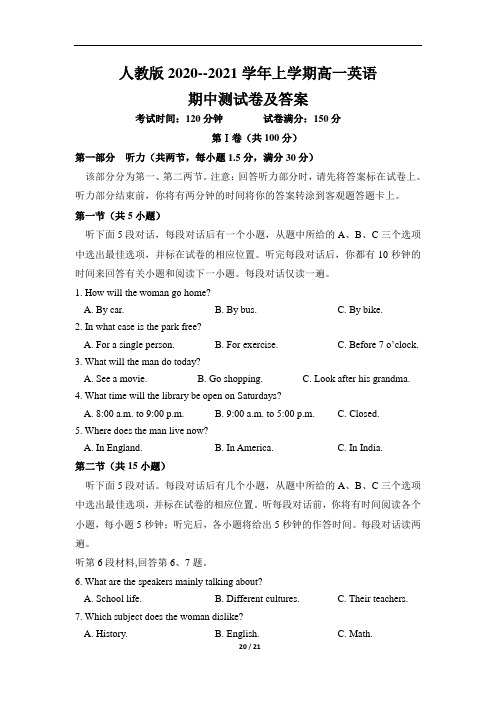
人教版2020--2021学年上学期高一英语期中测试卷及答案考试时间:120分钟试卷满分:150分第Ⅰ卷(共100分)第一部分听力(共两节,每小题1.5分,满分30分)该部分分为第一、第二两节。
注意:回答听力部分时,请先将答案标在试卷上。
听力部分结束前,你将有两分钟的时间将你的答案转涂到客观题答题卡上。
第一节(共5小题)听下面5段对话,每段对话后有一个小题,从题中所给的A、B、C三个选项中选出最佳选项,并标在试卷的相应位置。
听完每段对话后,你都有10秒钟的时间来回答有关小题和阅读下一小题。
每段对话仅读一遍。
1. How will the woman go home?A. By car.B. By bus.C. By bike.2. In what case is the park free?A. For a single person.B. For exercise.C. Before 7 o’clock.3. What will the man do today?A. See a movie.B. Go shopping.C. Look after his grandma.4. What time will the library be open on Saturdays?A. 8:00 a.m. to 9:00 p.m.B. 9:00 a.m. to 5:00 p.m.C. Closed.5. Where does the man live now?A. In England.B. In America.C. In India.第二节(共15小题)听下面5段对话。
每段对话后有几个小题,从题中所给的A、B、C三个选项中选出最佳选项,并标在试卷的相应位置。
听每段对话前,你将有时间阅读各个小题,每小题5秒钟;听完后,各小题将给出5秒钟的作答时间。
每段对话读两遍。
听第6段材料,回答第6、7题。
6. What are the speakers mainly talking about?A. School life.B. Different cultures.C. Their teachers.7. Which subject does the woman dislike?A. History.B. English.C. Math.听第7段材料,回答第8、9题。
人教版2020--2021学年上学期高一英语期中测试卷及答案(含五套题)

人教版2020--2021学年上学期高一英语期中测试卷及答案考试时间:120分钟试卷满分:150分第一部分听力(共两节,满分30分)第一节(共5小题;每小题1.5分,满分7.5分)1. Why hasn’t the woman finished her homework?A. Her hands are injured.B. She has a low fever.C. It is too cold.2. What does the man do?A. He is a taxi driver.B. He is an airport clerk.C. He is a computer operator.3. When does the woman’s boat leave?A. At 10:35.B. At 11:35.C. At 12:35.4. What does the woman want the manA. To get a haircut.B. To do some shopping.C. To attend a party.5. How does the man know the advertisement?A. By calling the manager.B. By visiting the hotel.C. By reading today’s newspaper.第二节(共15小题;每小题1.5分,满分22. 5分)听第6段材料,回答第6、7题。
6. What are the two speakers mainly talking about?A. When to eat food.B. How to lose weight.C. How to cook food.7. Why did the man’s friend fall ill?A. Because he was overweight.B. Because he did little exercise.C. Because he ate a little food.听第7段材料,回答第8、9题。
2020-2021学年度高一上学期期中考试英语试卷及答案(含四套题)
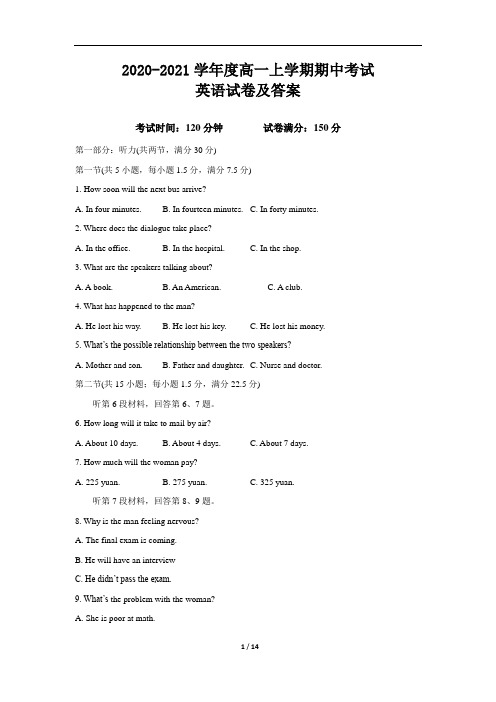
2020-2021学年度高一上学期期中考试英语试卷及答案考试时间:120分钟试卷满分:150分第一部分:听力(共两节,满分30分)第一节(共5小题,每小题1.5分,满分7.5分)1. How soon will the next bus arrive?A. In four minutes.B. In fourteen minutes.C. In forty minutes.2. Where does the dialogue take place?A. In the office.B. In the hospital.C. In the shop.3. What are the speakers talking about?A. A book.B. An American.C. A club.4. What has happened to the man?A. He lost his way.B. He lost his key.C. He lost his money.5. What’s the possible relationship between the two speakers?A. Mother and son.B. Father and daughter.C. Nurse and doctor.第二节(共15小题;每小题1.5分,满分22.5分)听第6段材料,回答第6、7题。
6. How long will it take to mail by air?A. About 10 days.B. About 4 days.C. About 7 days.7. How much will the woman pay?A. 225 yuan.B. 275 yuan.C. 325 yuan.听第7段材料,回答第8、9题。
8. Why is the man feeling nervous?A. The final exam is coming.B. He will have an interviewC. He didn’t pass the exam.9. What’s the problem with the woman?A. She is poor at math.B. She is afraid to speak in public.C. She has little job experience.听第8段材料,回答第10至12题。
2020-2021学年度高一上学期期中考试英语试卷及答案(含三套题)
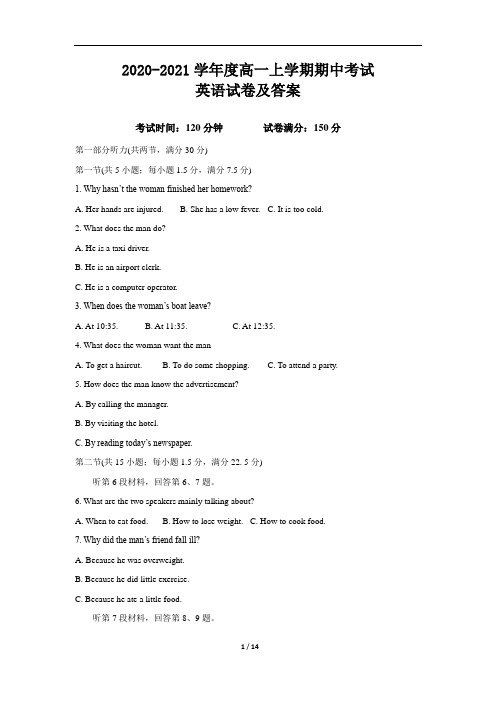
2020-2021学年度高一上学期期中考试英语试卷及答案考试时间:120分钟试卷满分:150分第一部分听力(共两节,满分30分)第一节(共5小题;每小题1.5分,满分7.5分)1. Why hasn’t the woman finished her homework?A. Her hands are injured.B. She has a low fever.C. It is too cold.2. What does the man do?A. He is a taxi driver.B. He is an airport clerk.C. He is a computer operator.3. When does the woman’s boat leave?A. At 10:35.B. At 11:35.C. At 12:35.4. What does the woman want the manA. To get a haircut.B. To do some shopping.C. To attend a party.5. How does the man know the advertisement?A. By calling the manager.B. By visiting the hotel.C. By reading today’s newspaper.第二节(共15小题;每小题1.5分,满分22. 5分)听第6段材料,回答第6、7题。
6. What are the two speakers mainly talking about?A. When to eat food.B. How to lose weight.C. How to cook food.7. Why did the man’s friend fall ill?A. Because he was overweight.B. Because he did little exercise.C. Because he ate a little food.听第7段材料,回答第8、9题。
- 1、下载文档前请自行甄别文档内容的完整性,平台不提供额外的编辑、内容补充、找答案等附加服务。
- 2、"仅部分预览"的文档,不可在线预览部分如存在完整性等问题,可反馈申请退款(可完整预览的文档不适用该条件!)。
- 3、如文档侵犯您的权益,请联系客服反馈,我们会尽快为您处理(人工客服工作时间:9:00-18:30)。
人教版2020--2021学年上学期高一英语期中测试卷及答案考试时间:120分钟试卷满分:150分第一部分听力(共两节,满分30分)第一节(共5小题;每小题1.5分,满分7.5分)1. Why hasn’t the woman finished her homework?A. Her hands are injured.B. She has a low fever.C. It is too cold.2. What does the man do?A. He is a taxi driver.B. He is an airport clerk.C. He is a computer operator.3. When does the woman’s boat leave?A. At 10:35.B. At 11:35.C. At 12:35.4. What does the woman want the manA. To get a haircut.B. To do some shopping.C. To attend a party.5. How does the man know the advertisement?A. By calling the manager.B. By visiting the hotel.C. By reading today’s newspaper.第二节(共15小题;每小题1.5分,满分22. 5分)听第6段材料,回答第6、7题。
6. What are the two speakers mainly talking about?A. When to eat food.B. How to lose weight.C. How to cook food.7. Why did the man’s friend fall ill?A. Because he was overweight.B. Because he did little exercise.C. Because he ate a little food.听第7段材料,回答第8、9题。
8. What does the woman want to do at first?A. Change the gloves.B. Return the gloves.C. Try on the gloves.9. How much will the woman pay to get the gloves she likes?A. $ 4.B. $ 25.C. $ 29.听第8段材料,回答第10至12题。
10. What is the woman thinking about?A. Getting more money.B. Doing better in her job.C. Changing her job.11. How does the woman like her present job?A. It is difficult.B. It is interesting.C. It is poorly paid.12. When does the woman have to decide?A. Today.B. Tomorrow.C. The day after tomorrow.听第9段材料,回答第13至16题。
13. Why does the man make the phone call?A. To ask for a colored picture.B. To order some machines.C. To know the delivery time.14. What will the woman do this afternoon?A. Email the man a picture.B. Work out the agreement.C. Attend a meeting.15. Why can't the machines be delivered by the end of this month?A. There aren’t enough machines.B. The distance is too long.C. The time is too limited.16. When will the man sign the agreement?A. This evening.B. Tomorrow morning.C. At noon tomorrow.听第10段材料,回答第17至20题。
17. Which is not provided for the pets in America?A. Clothing.B. Education.C. Medical care.18. Why do some owners dress their pets in pretty clothes?A. Because the pets will give performances.B. Because the pets will attract people’s attention.C. Because the owners want to keep their pets in fashion.19. Which of the following is unusual pets in the US?A. Birds.B. Fish.C. Monkeys.20. Which pets can be trained to help disabled people?A. Dogs and cats.B. Birds and monkeys.C. Dogs and monkeys.第二部分阅读理解(共两节,满分40分)第一节(共15小题;每小题2分,满分30分)AAfter noticing that her eighth grade students had problems focusing during math class, a North Carolina teacher decided to channel(引导) their energy in a different way—cycling.It doesn't sound like the most common thing to do during math class, but Bethany Lambeth, a teacher from Wake County, says that ever since she installed(安装)cycling machines under her students’ desks, the quality of their work has improved greatly. They are paying more attention to what the teachers say, and, most importantly, they are no longer fidgeting (坐立不安)all the time."Before, they were drumming on their desks or touching other students. They don’t do that any more now. Their feet are getting the movement out," she said. "There has been a huge increase in the quality of our students’ work and a decrease in the amount of missing work. I think the world is changing a lot and kids need to be able to do something different."Lambeth installed the cycling machines at the end of last year, which cost around $ 150 each. The cost was covered by money from kind people. Not all desks have pedals (踏板)under them, so not all the children have to use one. The school are hoping to get more pedals because of the role cycling machines could play.The kids clearly love the new "toys". Sofia Fedele, one of Lambeth’s students, said cycling helped her focus on (专注)her work during class. "I usually tap my feel and stuff to keep me focused. I think pedaling is much better. It keeps me exercisingand focused," she said.Quinn Spear, another student in Lambeth’s class, also mentioned the good effect on health of cooling during class. He told porters that he had pedaled 5. 5 miles and burped 133 calories; all before 10 am.21. What is the passage mainly about?A. The school that Bethany Lambeth works in.B. A new way of exercising that is becoming popular.C. How students in a North Carolina school have class.D. How a machine changes students’ performance in class.22. What effect does cycling have on students according to the passage?A. Students lose weight by cycling.B. Students pay attention to their study.C. Students have few fights with each other.D. Students do their homework more quickly.23. Who paid for the cycling machines?A. The government.B. Some unknown people.C. The students.D. Some companies.24. Why does the writer mention Quinn Spear in the last paragraph?A. To persuade readers to follow his example.B. To prove that he is a nice student.C. To tell us that he has changed a lot.D. To show the kids love the cycling machines.BMary and her husband Jim had a dog, Lucky. Lucky was a real character. Whenever Mary and Jim had friends come for a weekend visit, they would warn their friends not to leave their luggage open because Lucky would help himself to whatever attracted him. Naturally someone would forget and something would come up missing. Mary or Jim would go lo Lucky’s toy box in the basement(地下室)and there would be the treasure.It happened that Mary found out she had breast cancer. Something told her shewas going to die of this disease. She was just sure it was serious. The night before she was to go to the hospital she hugged Lucky. A thought struck her. What would happen to Lucky? Although the three-year-old dog liked Jim, he was Mary’s dog through and through. "If I die, Lucky will be abandoned(抛弃),'Mary thought. "He won’t understand that I don’t want to leave him. "The thought made her sadder than think ing of her own death.The operation was harder on Mary than her doctors had expected and Mary stayed in hospital for over two weeks. Jim took Lucky for his evening walk regularly but the dog was just in low spirits. Finally the day came for Mary to leave the hospital. When she arrived home, Mary was so tired that she couldn’t even make it up the steps to her bedroom. Jim made his wife comfortable on the couch and left her to nap.Lucky stood watching Mary, but he didn’t come to her when she called him. It made Mary sad but sleep soon overcame her and she dozed. When Mary woke for a second she couldn’t understand what was wrong. She couldn’t move her head and her body felt heavy and hot. Panic soon gave way to laughter though when Mary realized the problem. She was covered with every treasure Lucky owned! While she had slept, the sad dog had made trip after trip to the basement, back bringing his beloved mistress (女主人)his favorite things in life. He had covered her with his love. Mary forgot about dying. Instead, she and Lucky began living again, walking further and further together every night.It has been 12 years now and Mary is still cancer-free. Lucky? He still steals treasures and hides them in his toy box but Mary remains his greatest treasure.25. Where did Lucky usually hide his treasures?A. In the bedroom.B. In the bathroom.C. In the basement.D. In the kitchen.26. Why was Mary sadder thinking of Lucky?A. Lucky always stole things from the luggage.B. Lucky would not do as Jim ordered him to.C. Lucky was too young to leave her.D. Jim might fail Lucky after her death.27. What can be inferred from the third paragraph?A. Lucky missed Mary very much.B. Lucky was unwilling to let Jim walk him.C. Jim didn’t treat Lucky so well as Mary.D. Mary was more willing to sleep on the couch.CColleges offer food pantries(食品储藏室)to students When Lone Star College student Dwyanya Earnhardt first heard about a food pan try opening al her college in September, she was embarrassed to ask for help, butkne w she needed it. She’s used the food pantry several times since.Lone Star College — Montgomery is among a growing number of US colleges opening food pantries for students. In the Houston area alone, San Jacinto College and the University of Houston - Downtown (UHD) have also added them.UHD opened its food pantry in spring. It, s hoping to increase its use through a program being introduced this term. About 100 to 150 students will be given food to use in a new food bank being opened inside the student services building."More students of different backgrounds can have higher education, but just because you got in it doesn’t mean you have the support coming from home to keep you in," said Patrick Jefferson, UHD, s assistant vice president for student affairs."Many of the students come after work, take their class, then they go home, and they don't leave their challenges at the front door," said Jefferson. "We’r e recognizing that we just can’t say, ‘We only worry about our students’ challenges in their studies. We have to think about the students as a whole person."Most of the money for Lone Star’s food pantry has come from teachers and students, including Earnhardt. After visiting the food pantry several times, Earnhardt started volunteering (自愿做)there. She tries to donate (捐赠) money to it whenever she can. The food pantry is open from noon until 3 p. m. on Tuesdays and Fridays, but students can request it at another time if needed. Nearly 590 students have used the pantry since it opened last fall.San Jacinto College has been offering food pantry services twice a month tostudents since 2013. The college sends a bag of items on certain days and has received more than 1,000 students, requests since it began. It allows students from all income levels to request food. UHD and Lone Star College - Montgomery also follow the same policy.28. What did Dwyanya Earnhardt think of the food pantry service?A. It was unacceptable.B. It was helpful.C. It needed improving.D. It was interesting.29. Why does the writer say "We have to think about the students as a whole person" in Paragraph 5?A. Because students’ need for food must also be considered.B. Because students must know the importance of saving food.C. Because students must be excellent in study and body.D. Because students must also get knowledge of society.30. Where is most of the money Lone Star’s food pantry receives from?A. The government.B. Well-off parents.C. Local businesses.D. Teachers and students.31. What can we learn about San Jacinto College?A. Only students from low-income families can ask for food pantry services.B. It offers pantry services twice a week to students in and outside the school.C. More than 1,000 students have used food pantry services up to now.D. It introduced its food pantry services from UHD and Lone Star College - Montgomery.DDo smartphones really make people smart? It seems like they do. As The Washington Post said, we can turn to the device(设备)to " quickly find facts both necessary and unnecessary"---the fastest way to a nearby cinema, how many centimeters equal an inch, or the name of the actor who starred in a "TV series, etc.With a smartphone, we don’t need to keep those pieces of information in our heads. However, new research suggests our devices are more than a convenience, as they are making us lazy thinkers.Researcher Gordon Pennycook believes that people are more intuitive (直觉的)thinkers than analytical(分析的)thinkers; that is, they’re more likely to rely on feelings to make decisions than to really analyze a problem —also rely more on their phones than their own brainpower. "Smartphones allow them to be even lazier than they would otherwise be, " said Science Daily.It's just this analytical thinking that smartphone users seem to avoid. In three studies on 660 participants, the researchers examined different thinking styles. Then they looked at the participants' smartphone habits.Participants in the study "who showed stronger analytical skills and greater willingness to think spent less time using their smartphones," reported Science Daily. What’s the difference between intuitive and analytical thinking? According to The Washington Post, the researchers used this question in the study: "A bat and a ball cost $ 1. 10 in total. The bat costs $ 1.00 more than the ball. How much does the ball cost?"An intuitive answer is that the ball must cost 10 cents. It is wrong —10 cents plus $ 1.10 equals $ 1.20, not $ 1.10. Only through analytical thinking can one arrive at the correct answer: The ball costs 5 cents."It is important to think beyond our gadgets, "Pennycook told The Washington Post, "There might be an advantage of using our smartphones, but we still have to think in analytical ways to make sure we are correct."32. What’s the main idea of the first paragraph?A. How to get to the nearest cinema.B. The importance of smartphones.C. How to use smartphones.D. The convenience of smartphones.33. What does the underlined word "gadgets" in the last paragraph probably refer to?A. Smartphones.B. Thinking styles.C. Abilities.D. Thinking limits.34. What has Gordon Pennycook found through the new research?A. There are more intuitive thinkers than analytical thinkers.B. Smartphones make analytical thinkers lazier than intuitive thinkers.C. Intuitive thinkers tend to rely more on their phones than their brainpower.D. Decisions based on one’s feelings are always wrong.35. Which of the following best describes Gordon Penriycook’s attitude toward smartphones?A. Disagreed.B. Careful.C. Supportive.D. Disappointed.第二节(共5小题;每小题2分,满分10分)The Rules of Surfing the InternetDo you obey the rules while surfing the Internet?Your Safety Is Your ProblemYou know there are signs in every parking garage saying they’re not responsible for lost or stolen items in your vehicle. 36.You’re Speaking in a Public Forum(论坛)Everything you post online is equal to posting it on the front page of the newspaper and delivering it to everyone around you. Some people may agree, and some may disagree. You may even strike a chord (引起共鸣)with enough people to start a movement. 37 Only say online what you’re willing to say in front of your grandma.38The content of your posts matters, and so does where you post them. The audience of a particular website may not agree with your particular message (or at least with the way you present it), so be careful what you post and where.Keep It CivilFreedom of speech is important —everyone should have the right to say what they want, and a few people who abuse this freedom can’t affect anyone. 39. This doesn’t mean there aren’t bad results to your words, however, so do it with care. Make an effort to be polite whether online or offline.You Should Be Anonymous(匿名的)Anonymity sounds like what some crazy hacker groups use, but it’s not.40 The reason why we all support anonymity is that we believe every human being deserves the basic human right of being anonymous. You should be anonymous too.A. You can say whatever you wantB. The Internet works the same wayC. It’s Not Just What You Post, but WhereD. Whether You Agree or Not, Majority Rules.E. You’ll never clean up the Internet, s not even worth tryingF. Anonymity is an ideal supported successful adults and inventors in every industryG. You can’t control what people do with your message, but you can control your messaged.第三部分:英语知识运用(共两节,满分45分)第一节:完形填空(共20小题;每小题1.5分,满分30分)Once upon a time, there was a herd(兽群)of deer living in the forest. Among them was a 'vise and respectable teacher, who taught the tricks and skills of 41 to the young deer.One day, the teacher’s younger sister visited him with her 42, hoping he would learn what is so important for deer. She said, "Dear brother, please teach my child the tricks and skills of deer" The teacher said to the young deer, "Very well, you can come at this time tomorrow for your first 43"At first, the young deer came to the lessons as he was 44 to. But soon, he became more 45 in playing with the other young deer than his lessons. He didn’t. 46 how dangerous it could be for a deer who learned 47 but deer games. So he started 48 classes. Soon he was playing truant(逃学)all the time.49 , one day the poor deer stepped in a snare (陷阱) and was 50. Since he was missing, his mother was 51 She went to ask her brother, "Have you taught your nephew the tricks and skills he needs 52 danger?"The teacher replied, " My dear sister, your son was disobedient (不服从的)and 53 to learn. Out of respect for you, I tried my best to 54 him. But he did not want to learn them. He was always absent from class! How could I 55 teach him? You are obedient and faithful, 56 he is not. There is no point trying to teach him."Later they heard the 57 news. The stubborn young deer who Played truant had been trapped and killed by a 58. He skinned him and took the meat home to hisfamily.The moral of the story is: nothing can’t be 59 from a teacher by one who 60 classes.41. A. survival B. life C. accident D. exercise42. A. daughter B. niece C. son D. nephew43. A. interview B. try C. test D. class44. A. rocked B. invited C. supposed D. instructed45. A. interested B. fluent C. concerned D. careful46. A. search B. realize C. describe D. imagine47. A. something B. everything C. anything D. nothing48. A. changing B. jumping C. cutting D. reviewing49. A. Unluckily B. Happily C. Surprisingly D. Suddenly50. A. hidden B. trapped C. packed D. kept51. A. puzzled B. angry C. hopeless D. worried52. A. in need of B. in hope of C. in time of D. in memory of53. A. unwilling B. anxious C. slow D. determined54. A. influence B. teach C. cure D. comfort55. A. closely B. strictly C. nearly D. possibly56. A. for B. and C. but D. so57. A. sad B. good C. disappointing D. disturbing58. A. passerby B. hunter C. farmer D. vet59. A. offered B. taught C. expected D. learned60. A. attends B. leads C. misses D. increases第二节(共10小题;每小题1.5分,满分15分)It was the last day of the final examination in a college. On the steps ofa building, a group of engineering students 61 (wait) for the last exam. On their faces was confidence.They knew 62 exam would be easy. The professor had said they could bring any books or notes during the test.Right after they came into the classroom, the professor handed 63 the papers.There were only five questions on the paper.Three hours passed. Then I he professor began to collect the papers. The students no longer looked confident. On their faces were nervous 64 (express). The professor watched the 65 (worry) faces before him, and then asked, "How many of you have completed all the five questions?" No hand was raised. "How many of you have answered four?" Still no hands. "Three? Two?" The students moved restlessly(不安地)in 66 ( they) seats. "One, then? Certainly somebody has finished one. "But the class kept silent. The professor said, "That is exactly 67 I expected. I just want to make you know clearly that even though you have completed four years of engineering, there 68 (be) still many things about the subject you don’t know. These questions you could not answer are common in everyday practice. "Then, 69 (smile), he added, "You will all pass this course, but your education has just begun."I have 70 (complete) forgotten the name of that professor, but not the lesson he taught.第四部分:写作(共两节,满分35分)第一节:短文改错(共10小题;每小题1分,满分10分)This morning, I got an email from the library. It said the book I reserved was ready to be picking up. Because I had always been waiting to read it, so at that moment I was very exciting. Outside the library, I saw the man driving around the small parking lot, try to find a parking space. He head for the disabled parking space, the only one that was free. He got off his car with a pile of library book to return. Seeing that, I offered to return the books to the man. He thanked me and jumped immediate into his car and drove off, keeping the disabled parking space free for someone needed it.第二节:书面表达(满分25分)假如你叫李华,是一名高中学生。
